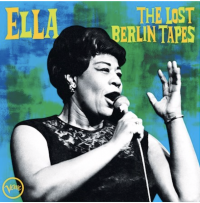Ella The Lost Berlin Tapes An Extraordinary Document!
Fitzgerald’s closely miked, unadorned vocals are powerful, playful and models of phrasing perfection. She makes it sound easy, which of course it could not have been—especially since she often performed two hour-long shows on a single night in two different cities.
The trio provides spacious, elegant beds—equally well-phrased—over which she soars, swoops and delivers a set of mostly joyful tunes. You could spend more than a few spins listening just to Smith’s swinging backing (and you should).
Fitzgerald had the previous year released Clap Hands Here Comes Charlie! (Verve V6-4053) a similarly vibed audiophile favorite backed by a small combo. She covers from that album “Jersey Bounce”, “Cry Me A River” and “Clap Hands, Here Comes Charlie!” along with many other “American Songbook” tracks—some well-known and some lesser so. She tips a figurative hat to Ray Charles on a rousing “Hallelujah I Love Him So” and ends the show with two favorites: “Mr. Paganini”, which she first recorded in 1936 and of course, “Mack the Knife”, her “hit” from her live album Ella In Berlin: Mack the Knife (Verve MG 4041) that earned her two Grammys at the 3rd annual Grammys—despite the fact that she’d forgotten the lyrics and had to improvise. She had no such trouble on this recording (though she did forget where she was) and her high energy, spirited performance is one of the album’s many highlights as is her surprising blues-soaked finale “Wee Baby Blues” in which she improvises it all—lyrics and blues.
Two other reasons why this album is remarkable: one of which is that the stereo recording is absolutely spectacular (the 1960 recording was mono only). According to Ella’s ‘80s era drummer Gregg Field (in an New Mexico NPR interview) who mixed the album, “It was sitting in a vault all of these years. When we were handed the tape box, it still had the yellow scotch tape that hadn’t been opened.”
If they were able to mix the album, it must have been a 3 track master tape. It sure sounds that transparent and “you are there” quality. And from the credits it appears that Ryan K. Smith cut it from a digital source. If that stops you from owning this on the double record set pressed at GZ Media on standard weight vinyl, your loss!
The final reason why this is a remarkable document is consider the date: 1962. Twenty years earlier America was at war with Germany trying to defeat Hitler. Twenty years earlier in the same Sportpalast arena that could hold upwards of 14,000 people, Joseph Goebbels delivered his “Total War” speech to a select audience of Nazi supporters. And here’s Ella singing and swinging twenty years later to an adoring audience in the same hall that had been seriously damaged during the war (it was demolished in 1973). Remarkable, indeed.



